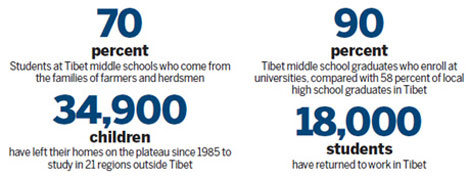Learning to close the gap
Updated: 2011-05-06 11:06
By Hu Yongqi (China Daily European Weekly)

Keeping ties to home
Like other Tibet middle schools, Beijing Tibet Middle School schedules activities designed to strengthen the students' ties to Tibetan customs. For example, all 810 students must attend one Tibet-language class every week, instructed by native teachers from Lhasa No 1 High School.
Nyima Ngodrup, a Tibet language major at Tibet University, focuses on Tibetan traditional cultures, history and customs for nine classes. "My job is to tell them what traditions stipulate, but it's up to them to follow or not. Most of them are extremely curious."
In 2004, the school held its first "Tibetan Culture Week" and more than 4,000 students have participated since then. The seven-day event involves Tibetan calligraphy, writing, debate, tug of war, handcrafts and a Tibetan singing contest.
An increasingly popular class over the past three years teaches students how to type the Tibetan language on a computer keyboard.
Tibetan-style food is a necessity for traditional festivals, of course, and chefs at the school canteen prepare in advance. On Tibetan New Year, the school's president and teachers arrive before 6 am to greet the students. In return, the students present them hadas, a traditional Tibetan gift for important guests.
Dawa Tsering, a graduate who works at a Tibetology institute, says some parties were held with local primary schools. "Children in Beijing had heard of Tibet but had never been there, so the exchanges between us told them how life was going in Tibet. And we Tibetan students could know what they were concerned with."
"Our concentration is on how to teach students well and live with them as a family," says Li Dongguang, secretary of the school's Communist Youth League Committee. "That's why our students will miss the life here after graduation."
Still an achievement gap
Seventy percent of students at Tibet middle schools come from the families of farmers and herdsmen, says Tenzin, the official from China Tibetology Research Center. He urges people and the government to maintain the importance that is attached to education for rural children because their educational resources are less than those for urban children in Tibet.
More than 90 percent of graduates from Tibet middle schools across the country enroll at universities, compared with 58 percent of local high school graduates in Tibet. Tenzin wants greater efforts to be made to enhance education development in Tibet.
Thousands of teachers step into Tibet to give classes to Tibetan students, while Tibetan teachers and school management personnel - 1,879 just from 2007 to 2009 - are trained in other regions.
"Students from Tibet should recognize that many people work together to provide them with an amiable environment for study," Tenzin says. "They should cherish the opportunity to study harder and show outsiders their real life and a real Tibet."
Dawa Tsering, 35, has traveled to more than 10 countries for academic exchanges to discuss with foreign scholars what is going on in Tibet.
"I usually tell them about my own experience - how Tibetan students are helped to learn more and to make a difference," he says. "More often, I invite them to Tibet to see the real Tibet with their own eyes."
He notes the particular challenges wrought by Tibet's topography, where the plateau elevation averages more than 5,000 meters. People need to work harder to achieve something other provinces could accomplish very easily, he says. "However, I believe Tibet will be better under the support of the central government and all people around the country."
E-paper

Tapping into the future
Foreign companies are investing in China's water industry as many predict a growing profit margin.
Headhunters ride on growth
Commercial property rides wave
Learning from the past
Specials

Cuisine central
London's Chinatown is helping diners appreciate full palate of Chinese food

Tying the knot
Danish couple's high-end macrame export business takes off in the mountains of Yunnan.

Truly a super woman
Li Yuchun first came to prominence in 2005 as the Super Girl winner, and since then has become an international star.
